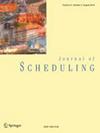周期调度的参数化复杂度分析
IF 1.8
4区 工程技术
Q4 ENGINEERING, MANUFACTURING
引用次数: 8
摘要
本文章由计算机程序翻译,如有差异,请以英文原文为准。
An analysis of the parameterized complexity of periodic timetabling
求助全文
通过发布文献求助,成功后即可免费获取论文全文。
去求助
来源期刊

Journal of Scheduling
工程技术-工程:制造
CiteScore
3.80
自引率
10.00%
发文量
49
审稿时长
6-12 weeks
期刊介绍:
The Journal of Scheduling provides a recognized global forum for the publication of all forms of scheduling research. First published in June 1998, Journal of Scheduling covers advances in scheduling research, such as the latest techniques, applications, theoretical issues and novel approaches to problems. The journal is of direct relevance to the areas of Computer Science, Discrete Mathematics, Operational Research, Engineering, Management, Artificial Intelligence, Construction, Distribution, Manufacturing, Transport, Aerospace and Retail and Service Industries. These disciplines face complex scheduling needs and all stand to gain from advances in scheduling technology and understanding.
 求助内容:
求助内容: 应助结果提醒方式:
应助结果提醒方式:


